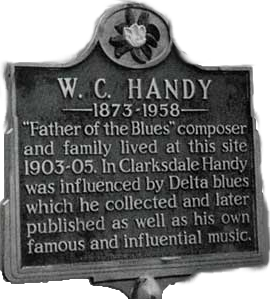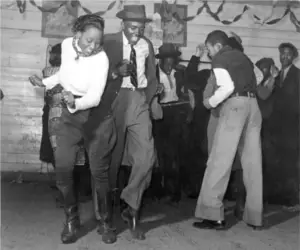DELTA BLUES
 The Mississippi Delta is the fertile alluvial plain that lies between the Mississippi and Yazoo Rivers in the north-west of the State. Highway 61 runs from Memphis to Vicksburg through the heart of the land.
The Mississippi Delta is the fertile alluvial plain that lies between the Mississippi and Yazoo Rivers in the north-west of the State. Highway 61 runs from Memphis to Vicksburg through the heart of the land.
The rich soil needs little irrigation, and the farms and plantations produce cotton, corn and a myriad other crops. In the early years of the 20th century, a seed was planted there that grew into the Blues that, with it’s citified cousin Jazz, revolutionised Western popular music.
WC Handy, known as the Father of the Blues, recalls waiting at the railroad station at Tutwiler in 1903, when he heard a tune picked out on a guitar. The player used a knife on the strings to produce a slide effect, that seemed to mimic the sad tones of the human voice, as he wailed about “Goin’ where the Southern cross’ the Dog”.
Handy’s keen ears allowed him to use what he heard to write the earliest recognised Blues songs, using the characteristic chord progression and A-A-B rhyme scheme.
In 1902 a 16-year-old girl was touring through the same area with her minstrel parents, when she heard a woman singing a sad love song, and was so moved that she learned the song by heart, and used it as an encore in her vaudeville act. When the girl was married two years later to William Rainey, they performed as Ma and Pa Rainey, ‘the Assassinators of the Blues.’ These two incidents, so close together in time and place, could be said to mark the the Birth of the Blues.

 By the mid-twenties the juke-joints, dances and fish-fries in every little town in the Delta, were moving to the sound of the Blues. Delta Blues is characterised by insistent repeated guitar riffs, and heart rending vocal lines that owe a lot to the work songs and ‘field hollers’ that the audience, and players, heard around them every day. Just outside Clarksdale at the Will Dockery Plantation there was a worker called Henry Sloan, who rarely left the district, but whose reputation as a stylish performer spread across the Delta. Charlie Patton, Willie Brown and ‘Son’ House all lived at Dockery on and off, and swapped songs, tunes and licks between themselves and other musicians who would call there on their travels round the area. This focal point was an important nexus in the development of the Delta Blues. Tommy Johnson, Joe Callicott, Sam Carr, HoneyBoy Edwards and most famously Robert Johnson, were among the players under the tutelage of this formative ‘school’. There ware many other centres for the Blues in the Delta. Skip James, for instance, was a leading light in the Bentonia ‘school’, which featured a high ‘falsetto’ vocal technique that stretched a single syllable over several notes and was often played in a minor key. Self-taught players like Mississippi John Hurt, Tommy McClennan and brothers ‘Papa’ Charlie and ‘Kansas Joe’ McCoy, and hundreds of others were playing all over the Delta.
By the mid-twenties the juke-joints, dances and fish-fries in every little town in the Delta, were moving to the sound of the Blues. Delta Blues is characterised by insistent repeated guitar riffs, and heart rending vocal lines that owe a lot to the work songs and ‘field hollers’ that the audience, and players, heard around them every day. Just outside Clarksdale at the Will Dockery Plantation there was a worker called Henry Sloan, who rarely left the district, but whose reputation as a stylish performer spread across the Delta. Charlie Patton, Willie Brown and ‘Son’ House all lived at Dockery on and off, and swapped songs, tunes and licks between themselves and other musicians who would call there on their travels round the area. This focal point was an important nexus in the development of the Delta Blues. Tommy Johnson, Joe Callicott, Sam Carr, HoneyBoy Edwards and most famously Robert Johnson, were among the players under the tutelage of this formative ‘school’. There ware many other centres for the Blues in the Delta. Skip James, for instance, was a leading light in the Bentonia ‘school’, which featured a high ‘falsetto’ vocal technique that stretched a single syllable over several notes and was often played in a minor key. Self-taught players like Mississippi John Hurt, Tommy McClennan and brothers ‘Papa’ Charlie and ‘Kansas Joe’ McCoy, and hundreds of others were playing all over the Delta.
Clarksdale is only a two hour bus ride from Memphis with it’s lively Blues scene around Beale Street, and many players gravitated there in search of audiences, recording deals and money.
It is hard to explain how such a relatively small community produced such a huge wave of cultural effect. Maybe there’s something in the water!